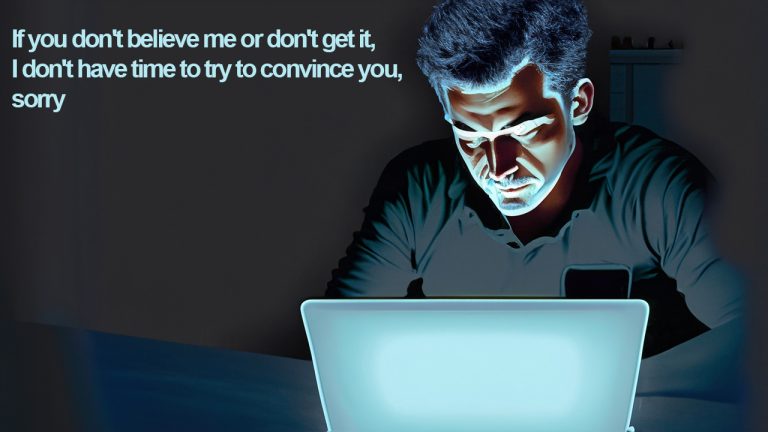Decade-Old Wisdom: Unpacking Satoshi Nakamoto’s Definitive Quote on Bitcoin Transaction Challenges, 13 Years On

Thirteen years ago to the day, the enigmatic creator of Bitcoin, Satoshi Nakamoto, pronounced a quote that has since reverberated across various contexts. This prominent aphorism: “If you don’t believe me or don’t get it, I don’t have time to try to convince you, sorry,” was Nakamoto’s curt response to questions surrounding the potential solutions for Bitcoin’s transaction speeds and double spending issues.
The 13th Year Anniversary of Nakamoto’s Iconic Quote
In the summer of 2010, Satoshi Nakamoto was a palpable presence in the nascent world of digital currency, busily shaping Bitcoin’s path and engaging in lively dialogues online. Within a span of two weeks – from July 2 to July 17, 2010 – Nakamoto found the time to articulate 73 thoughtful responses on specific discussions hosted on the forum bitcointalk.org. It was in this buzzing hub, on July 29, 2010, that Nakamoto memorably posted his now-famous line, “If you don’t believe me or don’t get it, I don’t have time to try to convince you, sorry,” in a thread aptly titled: “Scalability and transaction rate.”
Nakamoto’s comment was in response to the statement from another crypto proponent who said: “10 minutes is too long to verify that payment is good. It needs to be as fast as swiping a credit card is today.” Nakamoto replied by saying:
See the snack machine thread, I outline how a payment processor could verify payments well enough, actually really well (much lower fraud rate than credit cards), in something like 10 seconds or less. If you don’t believe me or don’t get it, I don’t have time to try to convince you, sorry.
The Snack Machine Thread
Bitcoin’s creator left a link to the “snack machine thread,” which discusses the problem of how to enable fast transactions for small purchases like from a vending machine using BTC. The issue is that BTC transactions take some time to confirm on the blockchain, so someone could double-spend before the transaction is confirmed and get a product from a vending machine without actually paying for it. The participants discussed ideas like debit accounts, escrow services, and prepaid accounts to enable fast transactions without waiting for blockchain confirmations.
The core problem is that the Bitcoin network takes about ten minutes on average to confirm transactions, but vendors need transactions to process instantly to deliver products right away. But if transactions aren’t confirmed, people could double-spend BTC to cheat the system or vendor. In the bitcointalk.org thread, an escrow service is suggested to enable instant transfers between accounts while still doing blockchain confirmations, but this adds costs through a third party.
Nakamoto suggests a solution where a payment processor listens for double-spend attempts and alerts if it detects any before a transaction propagates across the whole network. This would prevent most double-spend attacks. Nakamoto then provides a simple example of how fast a transaction can spread throughout the network.
In this example, if one transaction has even a small head start, it will spread throughout the network faster than the other one (the double-spend). It illustrates the exponential growth of transaction propagation – an early lead can result in an overwhelming advantage due to the geometric (exponential) nature of network propagation.
“So if a double-spend has to wait even a second, it has a huge disadvantage,” Nakamoto wrote at the time. “The payment processor has connections with many nodes. When it gets a transaction, it blasts it out, and at the same time monitors the network for double-spends. If it receives a double-spend on any of its many listening nodes, then it alerts that the transaction is bad.” Bitcoin’s inventor added:
A double-spent transaction wouldn’t get very far without one of the listeners hearing it. The double-spender would have to wait until the listening phase is over, but by then, the payment processor’s broadcast has reached most nodes, or is so far ahead in propagating that the double-spender has no hope of grabbing a significant percentage of the remaining nodes.
The “snack machine thread” has played a recurring role in a multitude of discussions over time. After Nakamoto’s initial response and a subsequent, seemingly rushed reply in a separate post, his comment was notably brief. Perhaps the architect of Bitcoin felt a robust certainty in the solution previously provided in the “snack machine thread” or, quite possibly, Nakamoto was inundated with other commitments that day, leading to a more clipped response.
The exact motivations remain shrouded in mystery, but the remark about lacking the time to explain has since been conjoined with the broader narrative of Bitcoin. It’s celebrated as a poignant aphorism, encapsulating the inherent challenge in truly grasping the intricate mechanics of Bitcoin.
How do you interpret Satoshi’s wisdom today? Share your thoughts and opinions about this subject in the comments section below.
from Bitcoin News https://ift.tt/ht9ZYs7
Comments
Post a Comment